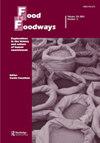抵抗和废除的食谱:在监禁期间精心制作烹饪话语
IF 1.1
Q2 ANTHROPOLOGY
引用次数: 1
摘要
摘要食谱可以作为一份配料和说明清单、一种保存传统的方法和一份历史记录。这些烹饪特定食物的指南可以揭示对过去的渴望,使用口味和材料唤起对人和地方的记忆,以及一种可能性感,表明有可能实现目前遥不可及的目标。由被监禁者编写的食谱组成的食谱以所有这些方式发挥作用——同时提醒人们在尸体空间面临的压迫,展示他们即兴创作的能力,并反映他们抵抗国家的承诺。在这篇论文中,我研究了被监禁的美食作家的食谱,特别关注他们的内容和设计选择,包括特定的主题和主题、照片和艺术,以及食物类型。通过强调他们在烹饪、饮食和写作方面的个人经历,被监禁的人开始创造一种独特的烹饪话语。他们的食谱和食谱是抵抗的教学法,可以用作想象废奴主义可能性的工具。分享这些文本将放大被监禁的美食作家的声音,并展望自由建设的日常时刻。本文章由计算机程序翻译,如有差异,请以英文原文为准。
Recipes for resistance and abolition: crafting a culinary discourse while incarcerated
ABSTRACT A recipe can function as a list of ingredients and instructions, a method of preserving traditions, and a historical record. These guidelines for cooking particular foods can reveal a longing for the past, using flavors and materials to conjure up memories of people and places, and a sense of possibility, suggesting the potential to achieve something that is currently out of reach. Cookbooks comprised of recipes written by incarcerated individuals work in all of these ways – simultaneously serving as reminders of the oppression people face in carceral spaces, demonstrating their ability to improvise, and reflecting their commitment to resist the State. In this paper, I examine incarcerated food writers’ cookbooks, looking specifically at their content and design choices, including specific themes and topics, photographs and art, and types of food. By highlighting their personal experiences with cooking, eating, and writing, imprisoned individuals have begun to create a distinct culinary discourse. Their cookbooks and recipes operate as pedagogies of resistance that can be employed as tools to imagine abolitionist possibilities. Sharing these texts will amplify the voices of incarcerated food writers and foreground everyday moments of freedom building.
求助全文
通过发布文献求助,成功后即可免费获取论文全文。
去求助
来源期刊

Food and Foodways
ANTHROPOLOGY-
CiteScore
2.20
自引率
0.00%
发文量
16
期刊介绍:
Food and Foodways is a refereed, interdisciplinary, and international journal devoted to publishing original scholarly articles on the history and culture of human nourishment. By reflecting on the role food plays in human relations, this unique journal explores the powerful but often subtle ways in which food has shaped, and shapes, our lives socially, economically, politically, mentally, nutritionally, and morally. Because food is a pervasive social phenomenon, it cannot be approached by any one discipline. We encourage articles that engage dialogue, debate, and exchange across disciplines.
 求助内容:
求助内容: 应助结果提醒方式:
应助结果提醒方式:


